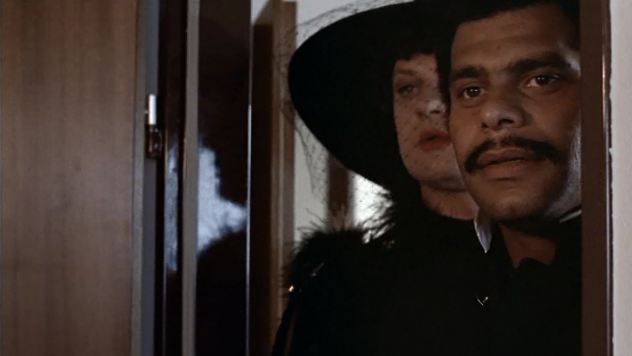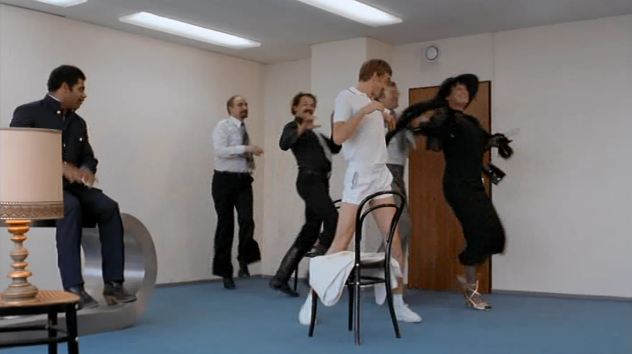Elvira's impulse in In a Year of 13 Moons to visit the reclusive Saitz is doomed from the start, but is the core of the film, and although the journey from man to woman is partially completed, despite two attempts to rerun, one at the beginning and one at the end, it is the main journey of the film. In moving through Saitz’s office, with its peculiar cast of Kafkan characters, Günther Kaufmann appears as the final barrier – the mythical gatekeeper as it were.
Irene and Marie-Ann talk about Kafka’s The Castle later in the film, and this isn’t just for colour. Actually, Fassbinder is so neat that he never leaves us clues in his text, especially literary and artistic clues, without affirming them at some other point.
With ‘Bergen-Belsen’ you can even disturb him while he’s screwing.
Günther Kaufmann was one of the most reliable of Fassbinder's actor, with a face and acting style that can simultaneously evoke warmth and threat. Certainly Kaufmann’s size makes him a perfect bodyguard or henchman type figure, but I’ve always found his face inscrutable, as if it’s impossible to know which way he is going to go next. Here, with no props or scenery other than a door, he manages to create a huge amount of anticipation and tension, merely in his smiling and yet firm inquisition. It’s yet another incredible revealing scene, built out of very little, and ending almost in a joke – with the eventual horrible discovery of Saitz’s favourite password.
Caption: That’s code 1A. ‘Bergen-Belsen’ works in every situation.
So while Smolik is fairly quiet and ultimately friendly and reflective with Elvira, when Saitz sepaks he jumps to attention like your average Gestapo officer.
Though Kaufmann was married when he met Fassbinder, the two began a romantic relationship. Kaufmann is often described as the first major love interest of the director's career. Like many of Fassbinder's relationships, it was troubled, and the director would often try to buy Kaufmann's affection with expensive presents, most famously cars. During their relationship, Fassbinder married Ingrid Caven, an actress who, like Kaufmann, regularly appeared in the director's films and was a member of his tightly-knit circle of friends.
By 1971, Fassbinder and Kaufmann had split up, and the director began an even more troubled relationship with a Moroccan immigrant, El Hedi ben Salem. Fassbinder and Kaufmann continued working together, and he appeared in many of the director's best known films, sometimes also contributing songs to the soundtrack. He appeared in Fassbinder's last movie, Querelle.
After Fassbinder's death, television work and another marriage marriage, Kaufmann played bit roles in films. In 1986, he married his third wife, Alexandra Kaufmann, to whom he would remain married until her death from cancer in 2001.
In the 1990s, he had begun to act more frequently, appeared in roles on many television shows. However, around 2000, acting jobs began to dry up and in 2001, Kaufmann's accountant Hartmut Hagen was found dead, apparently suffocated. Kaufmann and his late wife had supposedly defrauded Hagen of $500,000, and Kaufmann was accused of the accountant's murder.
In 2002, the death was ruled accidental after Kaufmann, who weighed close to 260 pounds at the time, confessed that he had fallen on the frailer Hagen during a fight and so he sentenced to 15 years in prison for blackmail and robbery. In 2005, a police investigation revealed that Kaufmann was not the perpetrator of the crimes, but had confessed in order to cover up for his wife and this same investigation also revealed that Hagen was not killed by Kaufmann, but by three men hired by Kaufmann's wife without his prior knowledge.
Since release from prison in 2005 Kaufmann has resumed his acting career, on films and on television. In In a Year of Thirteen Moons we find Kaufmann in much happier times however, as one of the Fassbinder powerhouse inner-circle actors, perfectly comic, perfectly straight.
Günther Kaufmann watches the dance
When Elvira’s body is discovered, Saitz and Zora are right there making love, and they care for this fact about as much as this fact as they did earlier about the animals. Fassbinder’s jokes are sometimes very unusual, and my favourite in the film has to be Kaufmann searching everyone that comes into the room to see the body – including of course the nun – the cherry on the top of the cake.


